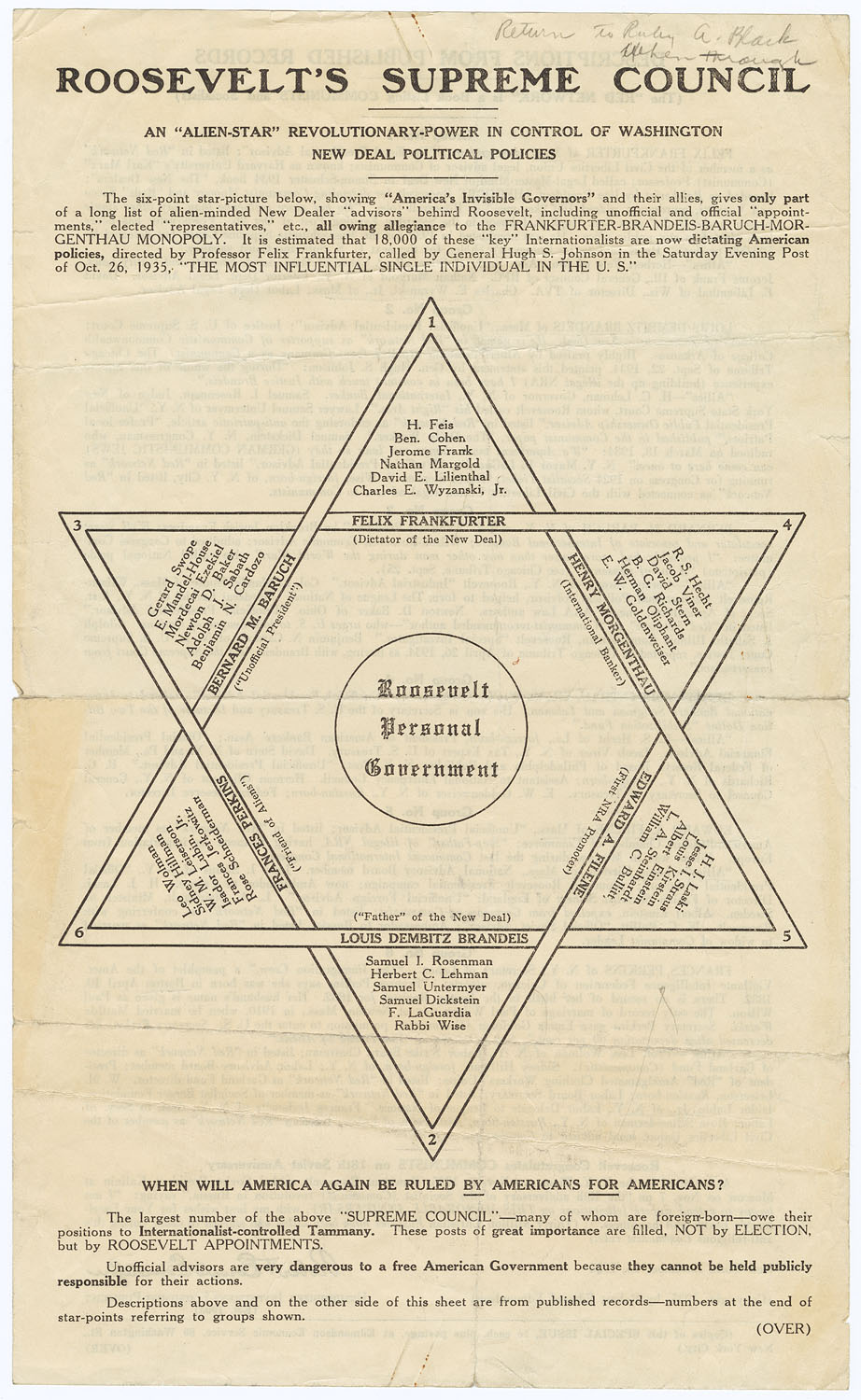Roosevelt's Supreme Council
First published in November, 1935, there were Americans who tried to warn the nation about the Jewish character of the Roosevelt administration, to no avail. ("Read More" for side 2.)

First published in November, 1935, there were Americans who tried to warn the nation about the Jewish character of the Roosevelt administration, to no avail. ("Read More" for side 2.)

It is a fact that one of our delegates was able to enter this camp. He approached the Commandant with a view to arranging a scheme of possible relief consignments for the civilian prisoners there. According to his impression, the camp was a type of "extensive concentration camp" where the detainees were compelled to do various kinds of work, including work outside the camp. Our delegate told us that he had not been able to discover any trace of installations for exterminating civilian prisoners. This fact corroborates a report which we had already received from other sources, i.e., that for several months there had been no further exterminations at Auschwitz. At all events, this is not a camp containing exclusively Jews....
The "holocaust" was mostly Soviet and jewish war propaganda, but it is certainly not history.
Morally, politically and militarily the Yalta Conference of February 4-11, 1945, was held under unfavorable conditions. The Soviet armies had recently launched a successful offensive. The memory of what proved to be the last German offensive, in the Ardennes region, was still fresh. The speed with which Germany would crumble before Eisenhower's offensive in the spring was not anticipated. Singularly faulty intelligence work had conveyed the impression that Japan still possessed large and effective forces in Manchuria.
The two leading figures in the American delegation, Roosevelt and Hopkins, were in very poor health and were committed by past attitudes to the policy of trusting Stalin and hoping for the best. The newly appointed Secretary of State, Edward R. Stettinius, possessed no visible qualifications for this office except an impressive shock of white hair, an adulatory attitude toward Roosevelt and a naive faith that all international problems could be solved by a determined application of goodwill and optimism.
HEARINGS BEFORE THE JOINT COMMITTEE ON THE INVESTIGATION OF THE PEARL HARBOR ATTACK
CONGRESS OF THE UNITED STATES SEVENTY-NINTH CONGRESS
FIRST SESSION
PURSUANT TO
S. Con. Res. 27
A CONCURRENT RESOLUTION AUTHORIZING AN INVESTIGATION OF THE ATTACK ON PEARL HARBOR ON DECEMBER 7, 1941, AND EVENTS AND CIRCUMSTANCES RELATING THERETO
PART 33
PROCEEDINGS OF NAVY COURT OF INQUIRY
(Pages 926-985, Exhibit 4, "Rainbow 5")
Printed for the use of the Joint Committee on the Investigation of the Pearl Harbor Attack
UNITED STATES GOVERNMENT PRINTING OFFICE WASHINGTON : 1946
This is an index of articles and other resources detailing the true history of World War II "death camps", those of the Allies under Dwight D. Eisenhower in which countless German soldiers and others had lost their lives.
The economic background to the war is necessary for a fuller understanding, before casting judgement on the originators of these viewpoints.
At the end of the First World War, Germany was essentially tricked [see Paul Johnson A History of the Modern World (1983) p24 and H Nicholson Peacemaking 1919 (1933) pp13-16] into paying massive reparations to France and other economic competitors and former belligerent countries in terms of the so-called Treaty of Versailles, thanks to the liberal American President Woodrow Wilson. Germany was declared to be solely responsible for the war, in spite of the fact that ‘Germany did not plot a European war, did not want one, and made genuine efforts, though too belated, to avert one.’ (Professor Sydney B Fay The Origins of the World War (vol. 2 p 552)).
As a result of these massive enforced financial reparations, by 1923 the situation in Germany became desperate and inflation on an astronomical scale became the only way out for the government. Printing presses were engaged to print money around the clock. In 1921 the exchange rate was 75 marks to the dollar. By 1924 this had become about 5 trillion marks to the dollar. This virtually destroyed the German middle class (Koestler The God that Failed p 28), reducing any bank savings to a virtual zero.
This website is a project of Christogenea.org
For Christogenea books and other merchandise, visit our page at Christogenea.com.